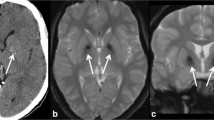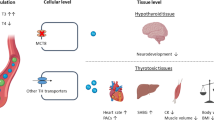Abstract
Thyroid hormones are known to be essential for growth, development, and metabolism. Recently, the monocarboxylate transporter 8 (MCT8) was identified as a thyroid hormone transporter, and MCT8 mutations have been associated with Allan-Herndon-Dudley syndrome, an X linked condition characterized by severe mental retardation, dysarthria, athetoid movements, muscle hypoplasia, and spastic paraplegia. Here we describe in detail the clinical and biochemical features and the response to thyroid hormone (L-thyroxine (LT4)) administration in a boy with an MCT8 mutation (c.1649delA) that truncates the protein in the twelfth transmembrane domain. It is of note that brain magnetic resonance imaging (MRI) revealed delayed myelination from infancy. Endocrine functions other than thyroid hormone regulation and metabolism were intact, resulting in normal hypothalamic/pituitary function tests. While LT4 administration suppressed thyrotropin (TSH) secretion, no significant changes in thyroid hormone values or clinical symptoms were observed. Conclusion: the characteristic thyroid hormone function tests and brain MRI findings may allow screening of high-risk populations for a better understanding of MCT8 pathophysiology.



Similar content being viewed by others
Abbreviations
- AHDS:
-
Allan-Herndon-Dudley syndrome
- CNS:
-
central nervous system
- D1:
-
type I deiodinase
- D2:
-
type II deiodinase
- D3:
-
type III deiodinase
- FSH:
-
follicle-stimulating hormone
- fT3:
-
free T3
- fT4:
-
free T4
- GH:
-
growth hormone
- IGF-I:
-
insulin-like growth factor-I
- LH:
-
luteinizing hormone
- LHRH:
-
luteinizing hormone-releasing hormone
- LT4:
-
L-thyroxine
- MCT8:
-
monocarboxylate transporter 8
- MRI:
-
magnetic resonance imaging
- MRS:
-
magnetic resonance spectroscopy
- OATP:
-
organic acid transporting polypeptide
- PRL:
-
prolactin
- rT3:
-
reverse T3
- T3:
-
triiodothyronine
- T4:
-
thyroxine
- TH:
-
thyroid hormone
- TMD:
-
transmembrane domain
- TRH:
-
thyrotropin-releasing hormone
- TSH:
-
thyrotropin
References
Abe T, Suzuki T, Unno M, Tokui T, Ito S (2002) Thyroid hormone transporters: recent advances. Trends Endocrinol Metab 13:215–220
Alkemade A, Friesema EC, Unmehopa UA, Fabriek BO, Kuiper GG, Leonard JL, Wiersinga WM, Swaab DF, Visser TJ, Fliers E (2005) Neuroanatomical pathways for thyroid hormone feedback in the human hypothalamus. J Clin Endocrinol Metab 90:4322–4334
Alkemade A, Friesema EC, Kuiper GG, Wiersinga WM, Swaab DF, Visser TJ, Fliers E (2006) Novel neuroanatomical pathways for thyroid hormone action in the human anterior pituitary. Eur J Endocrinol 154:491–500
Allan W, Herndon CN, Dudley FC (1944) Some examples of the inheritance of mental deficiency: apparently sex-linked idiocy and microcephaly. Am J Ment Defic 48:325–334
Biebermann H, Ambrugger P, Tarnow P, von Moers A, Schweizer U, Grueters A (2005) Extended clinical phenotype, endocrine investigations and functional studies of a loss-of-function mutation A150V in the thyroid hormone specific transporter MCT8. Eur J Endocrinol 153:359–366
Boyages SC, Halpern JP (1993) Endemic cretinism: toward a unifying hypothesis. Thyroid 3:59–69
Brown R, Larsen PR (2005) Thyroid gland development and disease in infants and children. In: http://WWW.THYROIDMANAGER.ORG website, version of February 28, 2005, MDTEXT.COM, INC, S.DARTMOUTH
Calvo RM, Jauniaux E, Gulbis B, Asuncion M, Gervy C, Contempre B, Morreale de Escobar G (2002) Fetal tissues are exposed to biologically relevant free thyroxine concentrations during early phases of development. J Clin Endocrinol Metab 87:1768–1777
Chan SY, Franklyn, JA, Kilby MD (2005) Maternal thyroid hormones and fetal brain development. Curr Opin Endocrinol Diabetes 12:23–30
Christoffolete MA, Ribeiro R, Singru P, Fekete C, da Silva WS, Gordon DF, Huang SA, Crescenzi A, Harney JW, Ridgway EC, Larsen PR, Lechan RM, Bianco AC (2006) Atypical expression of type 2 iodothyronine deiodinase in thyrotrophs explains the thyroxine-mediated pituitary thyrotropin feedback mechanism. Endocrinology 147:1735–1743
Dumitrescu AM, Liao XH, Best TB, Brockmann K, Refetoff S (2004) A novel syndrome combining thyroid and neurological abnormalities is associated with mutations in a monocarboxylate transporter gene. Am J Hum Genet 74:168–175
Dumitrescu AM, Liao XH, Weiss RE, Millen K, Refetoff S (2006) Tissue-specific thyroid hormone deprivation and excess in monocarboxylate transporter (mct) 8-deficient mice. Endocrinology 147:4036–4043
Friesema EC, Ganguly S, Abdalla A, Manning Fox JE, Halestrap AP, Visser TJ (2003) Identification of monocarboxylate transporter 8 as a specific thyroid hormone transporter. J Biol Chem 278:40128–40135
Friesema EC, Grueters A, Biebermann H, Krude H, von Moers A, Reeser M, Barrett TG, Mancilla EE, Svensson J, Kester MH, Kuiper GG, Balkassmi S, Uitterlinden AG, Koehrle J, Rodien P, Halestrap AP, Visser TJ (2004) Association between mutations in a thyroid hormone transporter and severe X-linked psychomotor retardation. Lancet 364:1435–1437
Friesema EC, Jansen J, Visser TJ (2005) Thyroid hormone transporters. Biochem Soc Trans 33(Pt 1):228–232
Halestrap AP, Meredith D (2004) The SLC16 gene family-from monocarboxylate transporters (MCTs) to aromatic amino acid transporters and beyond. Pflugers Arch 447:619–628
Halpern JP, Boyages SC, Maberly GF, Collins JK, Eastman CJ, Morris JG (1991) The neurology of endemic cretinism. A study of two endemias. Brain 114:825–841
Hennemann G, Visser T (2005) Cellular Uptake of Thyroid Hormones. In: http://WWW.THYROIDMANAGER.ORG website, version of February 22, 2005, MDTEXT.COM, INC, S.DARTMOUTH
Heuer H, Maier MK, Iden S, Mittag J, Friesema EC, Visser TJ, Bauer K (2005) The monocarboxylate transporter 8 linked to human psychomotor retardation is highly expressed in thyroid hormone-sensitive neuron populations. Endocrinology 146:1701–1706
Kakinuma H, Itoh M, Takahashi H (2005) A novel mutation in the monocarboxylate transporter 8 gene in a boy with putamen lesions and low free T4 levels in cerebrospinal fluid. J Pediatr 147:552–554
Lafreniere RG, Carrel L, Willard HF (1994) A novel transmembrane transporter encoded by the XPCT gene in Xq13.2. Hum Mol Genet 3:1133–1139
Ma T, Lian ZC, Qi SP, Heinz ER, DeLong GR (1993) Magnetic resonance imaging of brain and the neuromotor disorder in endemic cretinism. Ann Neurol 34:91–94
Oppenheimer JH, Schwartz HL (1997) Molecular basis of thyroid hormone-dependent brain development. Endocr Rev 18:462–475
Pizzagalli F, Hagenbuch B, Stieger B, Klenk U, Folkers G, Meier PJ (2002) Identification of a novel human organic anion transporting polypeptide as a high affinity thyroxine transporter. Mol Endocrinol 16:2283–2296
Schwartz CE, May MM, Carpenter NJ, Rogers RC, Martin J, Bialer MG, Ward J, Sanabria J, Marsa S, Lewis JA, Echeverri R, Lubs HA, Voeller K, Simensen RJ, Stevenson RE (2005) Allan-Herndon-Dudley syndrome and the monocarboxylate transporter 8 (MCT8) gene. Am J Hum Genet 77:41–53
Sugiyama D, Kusuhara H, Taniguchi H, Ishikawa S, Nozaki Y, Aburatani H, Sugiyama Y (2003) Functional characterization of rat brain-specific organic anion transporter (Oatp14) at the blood-brain barrier: high affinity transporter for thyroxine. J Biol Chem 278:43489–43495
Trajkovic M, Visser TJ, Mittag J, Horn S, Lukas J, Darras VM, Raivich G, Bauer K, Heuer H (2007) Abnormal thyroid hormone metabolism in mice lacking the monocarboxylate transporter 8. J Clin Invest 117:627–635
Yasuda T, Ohnishi H, Wataki K, Minagawa M, Minamitani K, Niimi H (1999) Outcome of a baby born from a mother with acquired juvenile hypothyroidism having undetectable thyroid hormone concentrations. J Clin Endocrinol Metab 84:2630–2632
Acknowledgements
We thank the patient and the members of the family for their cooperation, Ms. Keiko Takeoka for the rT3 measurements, and Drs. Kuriko Kagitani-Shimono, Ken Araya, and Hisashi Tanaka for interpretation of the MRI images.
Author information
Authors and Affiliations
Corresponding author
Rights and permissions
About this article
Cite this article
Namba, N., Etani, Y., Kitaoka, T. et al. Clinical phenotype and endocrinological investigations in a patient with a mutation in the MCT8 thyroid hormone transporter. Eur J Pediatr 167, 785–791 (2008). https://doi.org/10.1007/s00431-007-0589-6
Received:
Accepted:
Published:
Issue Date:
DOI: https://doi.org/10.1007/s00431-007-0589-6




